#my own arbitrary conundrums!!!
Text
seeing my art from 2015 getting bumped in my notifications again LMFAO noooo my art from highschool looked so bad
#im always at a back and forth at deleting old art bc im embarrassed of ppl thinking that's like recent art AKLSJDSA#BUT at the same time i like cataloguing old art for ppl to observe how everyone improves over time#my own arbitrary conundrums!!!#tbd
63 notes
·
View notes
Text
The Paradoxical Nature of Feyre
It’s interesting to consider just how much of Feyre’s character must overcompensate for Rhysand’s shortcomings as a character. I’ve always wondered at the impossibility of the morality involved in the characterization of feyre; in which, Feyre exists – as @feyres-divorce-lawyer has already elaborated on this this post – in this violent conundrum in which is operates as both the most qualified, but is oftentimes then characterized as the most inept to help.
To elaborate – Feyre’s character has to subsume an almost reverential when she is discussed in thorough conversations that question to her motivations, tactility, and efficiency. And because Feyre is never actually given qualities (or I should say – those qualities are never at the forefront when discussing why she is placed in these hierarchal / leadership positions) that prove she deserves to be a leader there’s no actual, tangible evidence to prove that Feyre is inherently qualified for any of these roles. When Helion asks Rhysand – “why did you make her High Lady” the story does not lean onto to any tangible reasons as to why we the reader should believe this other than ‘Rhys loved Feyre’
Here enters the actual problem with Feyre’s character: her being High Lady is a statement of Rhys goodness, not a statement on Feyre’s prowess. Because the story leans on such individualistic, arbitrary ideals, there’s nothing being said about Feyre as a character. So much of these conversations centers around Feyre being qualified but there’s nothing in the story that suggests otherwise. Feyre being reckless and brave prove that she is….reckless and brave – both those qualities don’t really make a good leader and they prove…nothing about Feyre’s skills. Realistically, of course Feyre knows close to nothing – of course she’s going to make very bad decisions and mistakes, of course her per view is limited. So much is put into proving that Feyre is the best that there’s often no conversation about how rigid that makes Feyre as a character.
Those are flaws that make Feyre a better character. One of my favorite moments when reading A Storm of Swords was the moment Davos realizes he needs to be able to read because ‘he’s a lord now.’ I love how he reflects on how hard the process is and how the children seem to read so easily and he has to sit down and sound out the words. Davos is such a good character because he represents the kind of struggles someone – lowborn, smuggler, illiterate, might have when integrating themselves into a new hierarchal world. But this also says something about him as a character – he chooses to begin the journey to learn how to read because he’s realized he needs tools in order to combat is inexperience. Even the fact that it’s not Feyre who realizes she needs to learn how to read but Rhys who forces her says so much about her character, negatively.
So when we have these conversations about Feyre, no one ever actually proves what makes Feyre qualified to lead. Begrudgingly feeding your family because you feel obligated doesn’t prove that you can lead an entire town; it proves perhaps resilience, perhaps resourcefulness but even then id argue Feyre isn’t even that (see: she seems to not learned any other skills other than hunting, complains about her shoes instead of just mending her own or switching with Nesta or Elain; she can’t cook, etcs). Rhysand making Feyre High Lady because he loves her says nothing about her as a character. It doesn’t expound her talents and skills – and ultimately doesn’t make anyone believe the title is tangible. Even the story doesn’t believe that to be true. Nothing about Feyre’s trials UTM prove that she is capable leader – if anything they prove the opposite (I do not mean this negatively – if anything, I’ve always felt that Nesta’s arc with the Valkyries fit Feyre much more than her own arc did. I could see Feyre being someone who operates under her own set of rules. I’ve always felt that Feyre seems to chafe under rules , so it doesn’t make sense that she would bound herself to such a leadership role as High Lady).
Back to the main point – the whole I’m making is that I believe that Feyre is talked about this way because so much of her character has to be muted to connect with Rhys. I think this conversation is always a consequence of Rhyland’s characterization and the novel's (and stans) rush to defend him. So many things have to be true about Feyre in order for her romance to Rhysand to be believable - and I argue that those changes are to the detriment of the traits Feyre's is initially characterized as having. And because Rhysand never has to undergo an actual character arc the pressure is placed on Feyre's character to align with the more negative traits Rhys possesses. Realistically, given how Feyre is characterized and given the whole “I hate the preening, gawking Spring Court” – I think its weird that she would immediately (1) do the exact thing in basically nothing with Rhys (2) allow herself to be turned into the most traumatic version of herself and (3) delight in random people’s pain. But because the story never asks Feyre to introspect she simply doesn’t talk about it. And even if the story wants to go there – so much of Feyre’s healing hinges on affirming that she is good and so introducing these bad, carnal, selfish thoughts into the mix seem to undermine that.
#anti sjm#anti rhysand#anti feysand#anti acosf#anti sjm: feyre a#anti sjm: feyre archeron#anfi acomaf#anti acomaf#anti acowar
136 notes
·
View notes
Text
AC and the Conundrum of Sequels
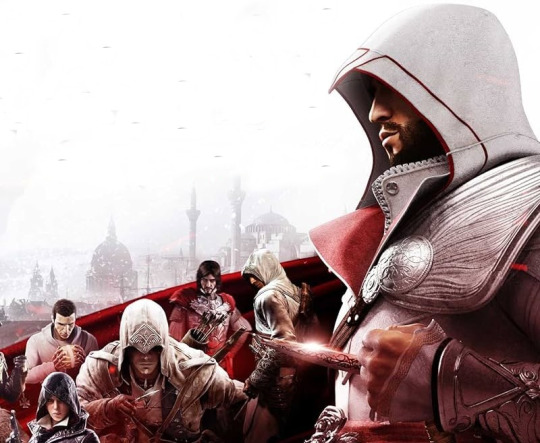
So I've noticed a particular trend that paraded many people's minds within the AC community, and that's been the gradual descent into this rather presumptuous mentality that the more sequel games a character has, the more unequivocally 'better' their development is as a character. This is often followed by Ezio used as the poster child.
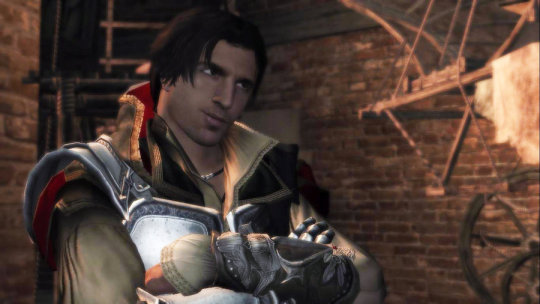
[Disclaimer: I don't hate Ezio or Bayek, I'm just using them to illustrate my points]
While I understand this sentiment, I've also learned that under a more critical lens, a lot in the case of Ezio's supposed "growth" has arguably always been more aesthetical than anything of substance.
When we are first introduced to Ezio in AC2, we are already bombarded with a character that is far too perfect. It's hard to think of any genuine flaws in his personality or behavior - especially those that have any lasting consequences for the plot. He never quite makes any mistakes either; it doesn't help that everywhere he goes there's a small army of people desperate to help him out. He also has actual armies willing to help him at the drop of a hat, as well as being best friends with one of the smartest people in human history. His achievements in the plot are all handed to him on a silver platter.
He's never made to learn to do anything for himself. At first, you feel like that could have been the point of the early game. Ezio's father and brothers are dead, he's a wanted man and he needs to protect his mother and sister. Then, instead of trying to get them to safety, he prioritizes a chance for revenge, which suddenly brings the whole city down on him, making it harder to protect his family. The whole thing would then set up a story about Ezio having to grow up, stop being so brash and arrogant, etc. Having been born into luxury and an easy life, he now has to learn how to provide for himself and others. But these opportunities are missed.
When it comes to Ezio's motivations, I always felt like there was no reason for him to continue pursuing the Templars after all the Florentine conspirators were dead. Nor is there any kind of "Creed" or higher calling at play here, since he doesn't remotely know what the Assassins are for another ten years. He just hears that there are some bad guys in Venice and decides to go kill them. By this point, he doesn't have any real reason or motivation to continue hunting them other than his own blood lust. As a result, Ezio often feels like he is a vehicle is that dictated by the plot rather than the other way around.
I mean, only look at the average description for his character arc:
"He went from a young teen to wise master assassin and mentor."
That's all there is to say for most people: arbitrary labels. Rarely do you receive any commentary around here that delves into any shifts within his mindset, outlook, point of view, or anything that isn't just this parroted and outdated take. When we get to Brotherhood, this problem is exacerbated more where Ezio is even more static than he was before (aside from leadership and giving orders), because his arc was already concluded in the game prior where we already spent over twenty years with him where he was already leading people and giving orders. It's just more pointless and reductive padding.

Bayek is another character that normally gets wrapped up in the sequel discussion, but genuinely ask yourself:
Is there anything else left to do with Bayek in a sequel?
Much like Ezio in AC2, his arc is also pretty much wrapped up by the end of Origins (including the Hidden Ones DLC). He begins looking for revenge for his son's death; takes a stand against the Templars when he realizes the problem is far bigger than just himself; founds the Assassins to fight this corruption. What else is there to really do with the character? His arc's been concluded, it's not even like AC2 where not killing Rodrigo Borgia left a door open for a potential sequel. Any new game would essentially have to come up with a load of new goals and motivations for him to the point you may as well just come up with a new character.
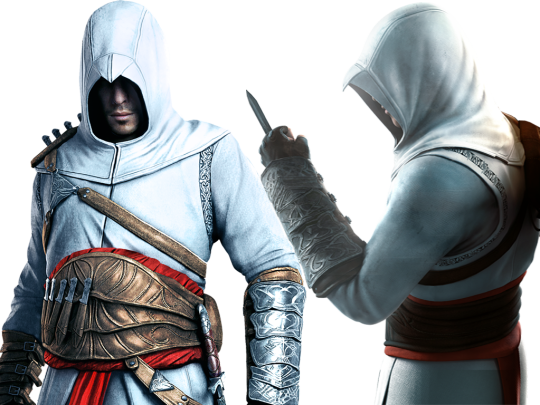
But this is frustrating because we see complete and profound development from characters like Altair in a single game, even before Revelations. He begins as an arrogant jerk who sees himself as better than everyone but slowly becomes a wise individual upon learning from the complexity of his enemies and the contradictions within his own Creed. It's learning from his allies and enemies alike, learning the pros and cons of concepts like freedom and control, about what is gained and lost from acquiring both in life, does he truly become not just a better leader for the brotherhood but a better man.
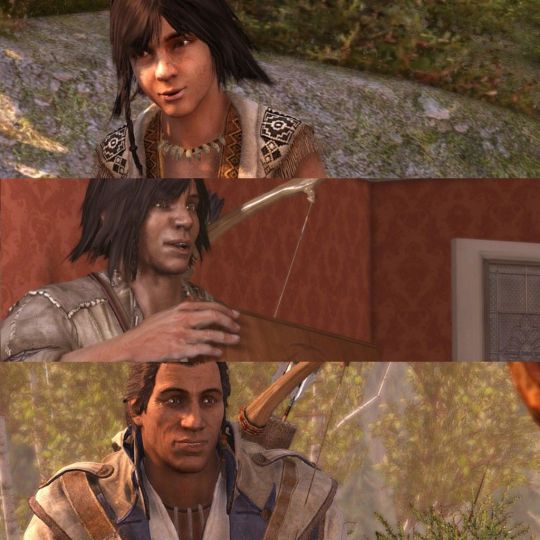
We also see the same from Connor in a single game. Starting as a naive idealist who wants to fix all the world's problems, only to realize that he'll never be able to do so. The consecutive deconstruction of his naivety through each of his interactions with allies and enemies alike teaches him that the ability to judge right from wrong can sometimes be lost in a world that's presently reluctant to do the same. But through it all, he maintains his faith in his convictions and compromises with what's in his control to forge a better tomorrow for humanity. Altair & Connor reach the same conclusions about life, human nature, and their place within the ongoing struggle in one game, a fraction of the time, as much, if not more than Ezio does in three.
Yet, more is needed because we've been spoiled and entitled to more than what was necessary with Ezio. And it's honestly this fixation that holds this series back. Whenever we delve into this topic, I never really feel like the underpinnings behind what sequels actually did for Ezio and his characterization are discussed beyond the surface-level shallow aesthetics, or the ignored light-switch motivations that have made many in the community so insistent that every other character must also have this kind of treatment.
#assassin’s creed 3#assassin's creed#assassin's creed 2#ezio auditore#ezio assassins creed#ac origins#bayek of siwa#ac bayek#connor kenway#ratonhnhaké:ton#altair#asscreed#seriously it's the time you make not the time you have#sequels are overrated yo#at least in this series it is#assassin's creed brotherhood
14 notes
·
View notes
Text
A conundrum which seems to bother no one but me regarding the restricted driving test.
You must supply your own vehicle for the restricted test.
You must have your restricted at least to rent a vehicle.
You must have the confidence of an instructor that you will undoubtedly pass to borrow an instructors car. If you do not practice outside of paid lessons it's a no.
Legally you may not drive a vehicle on your own for any reason on your learner's. Driving alone to the test is a failure.
So.
That means you must have a friend or family member with you in yours or their car to sit the test.
Here's the conundrum now.
If you have no support from anyone because everyone refuses to loan their vehicle or take time out of their life to sit next to you.
How do you get your driver's license.
An arbitrary requirement for any job in my country because no one trusts public transport to get you anywhere on time.
0 notes
Text
My sister and I were playing Far Harbour for the first time last night, and I’ll be honest here, I really don’t like the dialogue wheel when DiMA asks you if you might be a synth.
Like, okay, your options for responses are as follows:
How would I know?
I’m a human
I’m a synth
Sarcastic
Just looking at the flat, on-the-face-of-it choices for a moment, that’s …
This is where the dialogue wheel really struggles. Because those look both completely flat and completely arbitrary. Except for the first one, which is something you might actually say. So we said it. And then he prompts towards how you might know (dodgy memory gaps), and then just basically asks you again, so you have to choose one of the others.
Look. Before we get to any of the other answers, I don’t like this.
This is one of the driving questions of FO4. There is so much doubt, for everybody you meet, over who might be a synth, what that might mean, are their memories real, are they real, how would they know, if it was confirmed what would they do, and so many other questions. The entire Commonwealth is having a mass existential crisis over this question. No one knows the answer. And DiMA (or at least the dialogue wheel) just wants you to … arbitrarily pick an answer? With no indication of how you came to that conclusion? Yes, I’m a synth. I decided just now. No, I could only possibly be a human. Never mind that I’ve been helping the Railroad for ages and I’m in love with Nick Valentine, I instinctively reject the possibility that I could be a synth myself. They’re not …
I know how it’s maybe meant to sound. That you’re picking what your character instinctively feels about themselves. But there’s no room for doubt. The wheel just plops it flat. Are you or aren’t you. There’s no allowance for how pretty much every other person he could ask that question will have spent a decent portion of their lives wondering. Unless they’re a confirmed synth who knows their designation, and even then, they probably still wonder.
If you pick either option from that annoyingly flat and blunt choice, they expand out to:
I’m a human being, not a synth
I have to be honest, um, in the back of my mind, I’ve always suspected …
So, yes, apparently the first option was meant to make you sound vaguely racist. The voice acting (at least for the female survivor) puts a bit of an emphasis on ‘not a synth’ that does make her sound vaguely defensive and/or disgusted. It’s portrayed as a knee-jerk rejection.
If you choose the synth option, Nick likes it. So I’m guessing it was meant to be the more friendly option if you’re a general ally of synths. Or, you know, in love with one.
But. The thing is. Why are you saying either of them? There’s been no indication up to now (at least in our playthrough, and to be fair we haven’t gotten into the Institute yet) of what the survivor might actually think. There’s been no real indication of what she should think.
Why would she think she’s a synth? I’m not saying why would she wonder, there’s an infinity of reasons for that, I’m saying why would she pick an option that initially looks like conclusively saying she knows she is one. She doesn’t.
She could be. Very easily, though since we haven’t gone to the Institute yet our survivor doesn’t know a good few of the reasons why it would make sense. The most logical place for her to have been swapped would be that first wake-up in the cryo chamber, when Shaun was taken. It’s very easy to imagine that the original survivor actually died then, rather than got refrozen, and the one that woke up the second time was a synth. Especially since I gather it looks like Father was doing a lot of experimenting in general in allowing the survivor to be woken up. It would be very easy to think that the survivor that exists in the wasteland is a synth. There is the question of the memories, how would they have gotten a brain scan enough to picture some of the pre-War things from a corpse frozen in a tube, since Father himself likely can’t remember, but there are a good few sources of pre-War memories in the Commonwealth (hi Nick!), so it’s not too much of a stretch to imagine the Institute got their hands on enough to prompt and then fake the rest.
There are lots of little dialogue options in the game, usually when you’re talking to pre-War ghouls and/or Nick himself, that do make it sound like you have more pre-War memories. Remembering the details of Silver Shroud episodes, things like that. But, again, the Institute clearly has access to pre-War brain scans from CIT, so that can be explained.
But that doesn’t prove she’s a synth. And there are a lot of reasons for her to think she’s a human that have nothing to do with apparently being slightly racist. Primarily, because her story is already so weird as it stands. I’m a pre-war popsicle (possibly with brain damage from being frozen, defrosted, refrozen and defrosted again) that woke up in an apocalyptic wasteland. That’s a lot to swallow from a standing start, without wondering if I’m a robot with fake memories on top of it.
Admittedly, DiMA does say that. There’s a lot of explanations for dodgy memories that could happen to anyone, let alone someone with such a massive trauma and huge before-after divide as the sole survivor. Which, possibly, makes it more likely for her to be a synth, because hello tailor-made past to explain away internal inconsistencies. She’d make a great experiment. But it doesn’t make it more likely for her to believe she’s a synth. She thinks she comes from a time before they even existed. She has every reason to believe her own internal narrative about Vault 111 and waking up 200 years later. Regardless of her feelings about synths in general, she has no particular reason to believe she herself is one.
Which I think is my main problem with this dialogue wheel. It’s not really posing the question as a philosophical or existential conundrum, a question the survivor might actually ask herself. It’s asking the question as a means to make her pick a side.
So the option to say you’re human comes out vaguely defensive, something a Brotherhood operative would say. And the option to say you’re a synth makes the synths around you happy.
The wheel has nothing to do with what you actually think you might or might not be. It gives you no option to say you’re really not sure, you can’t decide, you don’t know. Well, it does, and then forces you to make a choice between them anyway. It makes you pick an option, and only gives a nod to doubt in hindsight, and only if you pick synth. The way the options play out, it makes it sound like you don’t make the choice based on what you think you are, you make the choice based on who you plan to side with (or have been siding with back in the Commonwealth). While presuming that the only reason you’d pick a side is that you’re part of it on a racial level.
It makes it sound like the only reason to think you’re human is because you hate the thought of being a synth. That any reasonable person would think that they probably are one, especially if they already like them and are an ally to them. That the only reason to be an ally with synths and want to help them is the idea in the back of your brain that you are one yourself.
Like, I don’t know if I’m overthinking this slightly because I didn’t like the flatness of the choice and then how our particular choice played out. We picked human, because to the best of our knowledge our survivor had no real reason to think she wasn’t one. And then what we said came out sounding like Maxson could have said it. Which, given that we’re a staunch Minuteman/Railroad member, and in love with Nick Valentine, did not please me in the slightest.
But I really do feel that the wheel is too flat, too arbitrary, comes out of nowhere, and frames your choices in a really manipulative way. While the base game does ask a lot of questions about who is or is not a synth, and several people do challenge you as one because they’re in paranoid meltdowns, this is the first time we’ve really been asked if we think we might actually be a synth. And for the first time you’re asked something, especially something so existentially fraught as this, are you really going to be able to give a flat, definite answer? Yes or no? Sure, I’m totally a synth. Not sure how I came to that conclusion, but absolutely I am one. Off the top of my head, yup.
(Sidenote: the way it dismisses your question of ‘How would I know?’ also annoys me. I know it’s because it’s meant to be a general ‘asking for clarification’ prompt, but it actually makes more sense as an answer in itself. How would she know? Why can’t that stand as her answer? But no, the wheel/DiMA presses you on to make a binary choice)
Why would you, as the player, pick ‘I’m a synth’, except that you’re siding with synths? The game has given you no evidence or asked you no direct questions up to now for you to genuinely think that your character is a synth. And I get RPing doubts, and the expanded version of that answer, what you actually say, is something I might have said had that been given as the initial option. In the back of my head, I have wondered if I might be. Because basically everyone in the Commonwealth has probably wondered that by now. But we had no reason to say ‘I am a synth’, like that was a thing we knew. Because we don’t.
The baseline assumption is going to be that you’re human. All your memories and evidence point that way. Unless you’ve been to the Institute and pulled your file and synth designation off their databanks, you’d have no way of knowing you’re a synth. So why would you say you are?
To get in good with Acadia. That’s why you’d say you are. Because you want to ally with synths, or infiltrate them, so you blithely say that you are one. Because clearly everyone knows that the only reason you’d help a synth or ally with them is if you are one.
I don’t like this dialogue wheel. I really, really don’t like it. I know it’s a system problem. The wheel system doesn’t expand on what you’re actually going to say, so you have to make your best guess based off dodgy summary prompts (which is why we basically never choose the ‘sarcastic’ option, because holy Hannah we’ve no idea if we’re going to be mildly snarky or cut someone to the bone with that one, and most of the time we’re not chancing it). But the particular way the initial prompts and then the actual dialogue in this one plays out has some very unfortunate implications. It does really feel like it enforces the ‘humans vs synths and if you are one, you’re antagonistic to the other’ divide. It feels like a choice designed to make you pick a side, and to declare yourself racially in order to do so. And I don’t like it.
Um. Right. Sorry for the rant.
(For the record, I am enjoying the DLC generally at the minute. Far Harbour as a setting is fantastically spooky and Lovecraftian, and running around it with Nick is great so far. But that particular moment really bugged me. Like a lot. Heh)
#meta#fallout 4#far harbour dlc#humans vs synths#clumsy dialogue wheel#i don't like it#possibly overreacting#but still
16 notes
·
View notes
Note
do you think eren is selfish? (especially about his own desires, but i think everyone could be selfish too? idk) because i saw someone said that isayama said it's easier to understand Eren if you consider him selfish.
This is a topic I’ve been pondering for a while now. Is anyone truly selfless? Is anyone not selfish? What if helping people is also your dream, something that makes you happy? To be selfless is to be “concerned more with the needs and wishes of others than with one's own”. But what if being in that state is also your wish?
See, no one does anything that doesn’t derive them with some form of benefit. It could be as simple as a feeling of pleasure or pride. People who do things for others willingly do it because they derive some form of joy or satisfaction out of it (if unwillingly, to avoid punishment). So technically speaking, aren’t those people selfish too?
If sticking to your values (and helping others is part of that) no matter what makes you selfish, then yeah, I guess Eren is selfish. But Eren has also said multiple times that he’s okay with dying if it meant saving humanity. And that sort of thought is very altruistic. So see? We have a conundrum.
The question of whether true altruism exists is actually an ongoing debate in science. I personally think there’s always a component of self-interest when we do altruistic things. At the very least, we do it because we’re told it’s the right thing to do. So a lot of times, we’re just doing it to fulfill that societal expectation.
On a different note, I believe Isayama has actually been projecting onto Eren lately (based on multiple interviews, but especially: “I’d say it’s maybe Eren after all ... with him came something of a feeling that he was part of an inner me that I didn’t really want to see”) and that’s why he calls him selfish. I think he might be putting a lot of his own feelings into Eren right now, and considering the social commentary in this chapter, I believe he may be reflecting his own experience of creating snk/dealing with people’s expectations for the ending through Eren.
Maybe this is his way of saying his journey of creating snk turned out to be different than what he dreamed of when he was younger, and he’s “disappointed” that his dream wasn’t as glorious as he imagined. Maybe this is his way of telling us that he’s tired of societal expectations and that he’s going to chase what he wants. Given the nature of Japanese culture, I can see why he’d view this sort of mentality of not complying with standards as being selfish.
But yeah, I just get the feeling that Isayama is really trying to drive home the point that we as humans are the root of our own problems, and thus the formation of civilizations is the very thing that restricts us from something as simple as exploring the world (just look at political boundaries for example; we literally divided the land into arbitrary pieces and said “this belong to me, you have to ask my permission to get here”). That’s my personal interpretation of this chapter at least.
P.S. I think Isayama saying it’s easier to understand Eren if you view him as selfish is him simplifying the topic based on societal norms for the people who can’t fathom the complexity he’s exploring lol.
#asks#snk spoilers#snk 131#ugh I'm not sure I communicated what I wanted to properly#like I know what I mean inside my head#but the words won't form in the way I want them to#hopefully you understand what I mean?#of course the stuff I said about yams is just speculation on my part#but I do base it on stuff he said in interviews#with all the comments about going to the sauna#he just seems very exhausted with the story#and I think it's because the fandom's/society's expectations of him and his story are wearing him down#he doesn't feel like he can go with the ending he actually wants because he'd get backlash or disappoint people#I mean isn't that why he changed the ending in the first place?#he felt it would be irresponsible to his fans#and because of his public spotlight he can't even explore 'darker' endings without people sending him hate or cancelling him#but yeah#that's just my opinion#eren#snk character analysis#snk analysis#snk themes#isayama hajime#snk speculation#snk ending#snk fandom#my opinion
13 notes
·
View notes
Text
Random Ask Dump - Anniversary Edition (50+ REALLY OLD ASKS!)
Going through OLD AND CRUSTY ASKS to try and chip away at the inbox. HERE WE GOOOO...

That’s an interesting idea, and I could run it by Cake, but I think it would honestly be a LOT to track from a programming perspective.
Especially ‘cause killing Sans is gonna result in a “bad ending,” so to speak.

An attempt was made by Undyne to have all three hang out at the same time. Papyrus was SUPER EAGER.
...but one thing led to another and there were many messy explosions of chemicals and lots of smoke.
Alphys had to step in before things got out of hand.
It was all very daunting for her. Pap and Undyne are VERY LOUD, VERY AMBITIOUS PEOPLE.

I actually have some ideas of some side comics I may do at some point! :o It’s just that right now there’s a lot going on.

I need to poke Carni about that at some point. He’s just been very busy with other projects!

Clearly he’s standing on the “out to lunch” sign.

I wanna say that it’s very possible in theory. :o It probably affects them differently since monsters’ emotional state affects their magic and their physical state.

I do like little easter eggs like that, though I’m not sure where I’d fit it in atm just ‘cause I already showed Pap’s room, haha.

I made the chase theme for Mad Dummy as well as Mad Mew Mew’s battle theme. @pinewsun made the battle theme for Mad Dummy, and @thomasthepencil made the Season Dude battle theme and MD’s overworld theme. :o
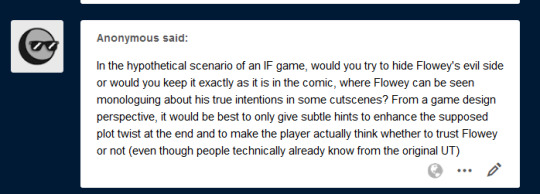
That’s a really fascinating conundrum! You’re absolutely right- if IF was a standalone game, then from a writing standpoint, having more subtle implications would make sense! The reason I chose a different approach for IF is because it’s set after Flowey’s already known to be evil and I like to give different POVs rather than stick to just Frisk’s.

That’s an interesting thing, actually- both fights lean heavily on the fourth wall. Both are treated as climaxes for their given routes.
It’s funny because Asriel’s fight is a lot more straightforward and less meta by comparison.

I agree! The thing with Papyrus is that he’s extremely powerful- he just doesn’t want to kill. But it’s a deliberate choice not to kill- he’s able to force his attacks to do next to no damage. He’s also pretty darn crafty, as he made the Gauntlet himself. It really is just a case of Undyne’s personal biases and concern for him.

That was a deliberate choice. :O Papyrus is very influential toward Frisk. He is best skeleboi.

Papybot loves you, anon! He just wants to feed you WHOLESOME SPAGHETTI!!!
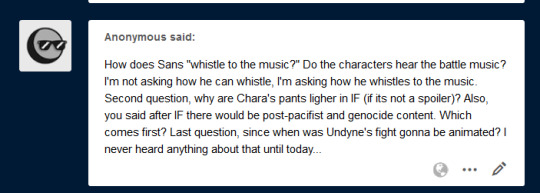
It is possible to whistle through teeth. ...alternatively, magic.
As for the music, Undertale implies that the music is heard! Maybe it’s just... a thing that exists in this world. Or it’s just meant to be a silly meta joke. I try to keep it somewhat ambiguous other than occasional nods to it. Chara’s pants are lighter because I just... felt like it, I guess? Haha. I wanted their feet and pants to stand out more from each other, so they have khaki pants.
As for the Undyne fight being animated, well, this ask is old by now, but Sparks was the one who was down for it.

Well, the teaser’s been out for a long time now, but that’s the idea! It’s also why this has been in production for so long. The Determinator has some really over the top attacks (that weren’t even shown in the teaser), and Sparks animated in Photoshop. That’s how hardcore he is.

Shhhhh. Don’t give me ideas. I’m already slacking on Tem Village. :P

Sometimes I do have slumps and burnouts (see Antipode’s lengthy hiatus), but breaks lead to me being refreshed and coming back with even more enthusiasm than before!

Oh, there are a lot of these throughout the comic. For instance...
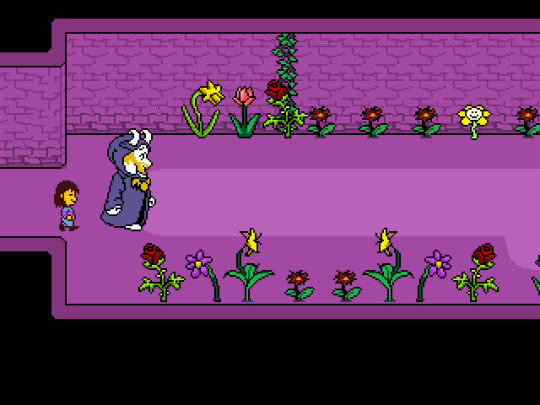
Flowey appears in a few background shots in the Ruins!


When Sans says “or maybe...” he looks at the empty flower pot. This was one of the earliest bits of foreshadowing about who created Flowey, and nobody noticed it at the time!

The MTT vending machines initially look like this but have helpful items.
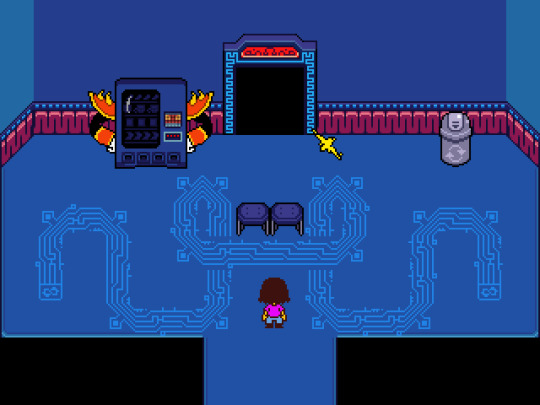
And then they look like this, with an angry face and pose- Mad Dummy has possessed them!

As of Part 38, it’s been revealed that he did first meet Asgore as “Santa.” As for whether or not he knows the truth, time will tell. :o



Oh, these are excellent suggestions for calls! I’ll try to keep these in mind.

So, I believe Glyde uses the Mysterious Door motif. Jerry uses the motif in its battle theme- I believe it’s a mix of original motif and Wrong Number song?

Sans is a master of power napping. He probably gets a decent amount of sleep, though.

There are a lot of ways to interpret Pap’s lack of sleep! In IF, he can get by without it, but he also has a lot of reasons to avoid sleeping. Some reasons include productivity but also due to a looooot of heavy baggage. More on that later.

I think sleep can definitely make monsters healthier. Rest = better mental health as well as physical health, and with how important mental and emotional help is for monsters, that’s very important!

They just really like socks. Socks are warm. Socks are slinky. And googly eyes are the best. So they took on the form of a really eccentric sock puppet and sock collector. Scandalous.

It also has Alphys’ motif, as the two are the leaders of the royal guard!

I would say the lack of Asgore as an influence has left Undyne slightly less grounded? Like, she had Toriel and Gerson in her life, but her relationship with Toriel is... definitely not quite as close? Like, Toriel by that point kept people at an arm’s length due to losing multiple children (including one from old age). So, while they were on friendly terms until the aftermath of the DT experiments and the tapes’ release, it was more like mutual respect and a sorta professional relationship with Undyne admiring Toriel and wanting to spare her from more heartache.

That is a really interesting idea. While that didn’t happen, I do need to maybe revisit the grumpy dog at some point or another. He’s still a lil’ salty.

I think in terms of layout it won’t change much, but there will be new/different content for sure. :O

Mad Dummy’s base design is mostly original, but she has a wig + headband from DIO from Jojo Part 3!
Fun fact: While MTT has Kamina shades, Papyrus’ goggles are loosely based on Simon from Tengen Toppa Gurren Lagann in terms of color. :O

So basically, when Asriel defeated Frisk, he had the power over the timeline to reset it as he pleased- in theory. However, that power was overwhelming for him, and due his lack of understanding OF said power and one last ditch attempt at resisting from Chara, things went wrong.

There is a track that takes some inspiration from Rage Awakened. It’s not released, and it’s not exact, but it won’t be released for a WHILE. Like until the part comes out.

I think it’s just the fact that tacos are so random. Like, my biggest beef in that regard was that OG Underswap had a lot of arbitrary replacements for things in UT and not all of them made sense. Like, if Sans was to make a foreign food, ramen would’ve made more sense due to Alphys being weeb trash, haha.

Okay, so the rough timeline iiiis...
Falling:
- Cyan
- Green
- Orange
- Blue
- Purple
- Yellow
Dying:
- Cyan
- Orange
- Blue
- Purple
- Yellow
- Green

You know, it’s funny because this ask is super old, but that’s basically sorta what happened. :O It became a beach-themed resort.
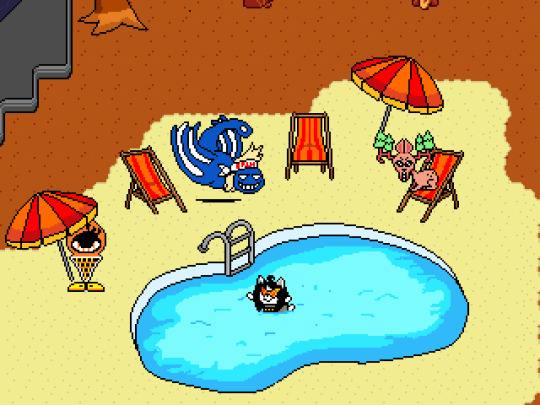
Never forget MTT fangirl Temmie’s pool escapades.

I think Forgespring for me because I had to make the tileset myself (it took a few months, I think?), but Aquarius was definitely in the works for a while. But once I had the tileset from Fours, the rooms were very easy to design!

That woulda been pretty rad! Maybe I can find another spot for it one day, haha.

I think for Dohj, I’d have to check with Fours, but I’m certainly not opposed at some point?
Right now, the following chars can take questions:
- Frisk
- Papyrus
- Sans
- Undyne
- Alphys
- Napstablook
- Mettaton
- Asgore
- Chara
- Flowey

Cyan appears in Part 45! :O No answer about orange for now, tho.

I do have vague ideas for Tem village. I just haven’t had time to go back and do it.

Stay tuned and you may find out! :O

Hmmmm... I had a lot of fun with MTT SPIRAL and the Determinator, tbh. They were both very time consuming, but I love how they came out!
Also, buff Jerry.

Turnabout Storm. :)
youtube
It’s a really awesome fan crossover that works way better than it should. :P

None taken! We know that with headcanons, everyone is gonna have their own interpretations. These are just the voices we liked for Fireglobe Production, but everyone has their right to their favored interpretations!

Yeah, Knight Knight is one of the coolest CORE mercs in the original game. It was fun to repurpose them for Inverted Fate as royal guards. :o It made room for unique encounters in the CORE in the form of them robots- as Undyne would rather use machines than other monsters to do her work.

Personally, I see it as an Asriel motif, but I also acknowledge that at one point it WAS gonna be an Asgore motif. Toby has a habit of just using whatever music works for a scene (see sans. at the snail farm.)

I do have a few ideas, though I won’t say for what yet. :o

He’s likely made blueprints for that train. :P

It probably would just have different flavor text/progression!

So basically, I treat the starting motif for BAaTH/Power of NEO is just a “true hero” motif.

MTT is definitely major in IF! As for whether or not he’ll have a hangout, time will tell. There’s definitely more to resolve with him, though.

I’m gonna remake at least a few of the older tracks, including Regret. My goal is just to bring the OST to a similar standard of quality.

So, animated parts coming up: Part 47, Part 49, Part 50. There may be some other parts, but we’re gonna wanna scale things back for a little bit for the sake of all our sanities.

I go with both. ;)

Honestly, probably fairly similar to the bully fight in the Ruins- which is why I ultimately decided not to do one. Both fill similar archetypes, though I think if I did do a battle, I woulda still had Flowey interrupt at the end and scare them off.

It’s a very emotional scene. Far more tragic than her geno death, IMO.
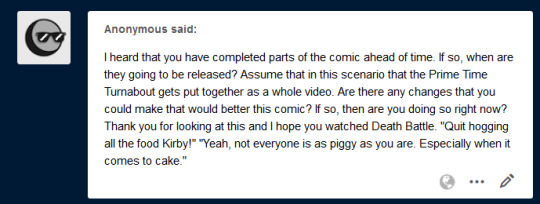
Well, the main goal in that regard is the remasters (Part 9 is in progress). Otherwise, I do think these hiatuses are good for working ahead. I’ve still gotta do more work, though, because my buffer this time around is a lot smaller from the trial-hiatus buffer. Alas!

Honestly, the website is the best thing to happen to IF. It’s allowed us to do so much with the comic’s presentation that would be impossible with imgur. NORIX IS THE BEST...
#inverted fate#ask dump#asks#undertale au#behind the scenes#undyne#frisk#papyrus#asgore#sans#alphys#lore#toriel#fallen humans
34 notes
·
View notes
Text

[ID: screenshot of an article. the text reads:
"MPD presented an insoluble conundrum for me as Chair of the DSM IV Task Force. I was convinced that it was an iatrogenically inspired diagnosis inappropriately inflicted on vulnerable patients by the poorly trained therapists who came away from their weekend workshops armed with an MPD hammer that seemed to fit every patient nail. My own inclination was to wise up therapists and protect vulnerable patients by simply omitting MPD from the DSM.
But my hands were tied. We had put down strict rules requiring high evidentiary standards before any change could be made in DSM IV. This was intended to prevent arbitrary changes by containing the diagnostic exuberance that typified the experts who were engaged in revising the manual. Any suggestion to expand the system required compelling evidence. But this sword cut both ways. Any change to reduce the system—like eliminating MPD—required equally compelling evidence. I couldn't rid DSM IV of MPD because I had to follow my own rules and there was no compelling proof that MPD didn't exist as a meaningful clinical entity. It was only my personal opinion—however certain I was. The best we could do to reduce the popularity of MPD and inspire caution in its diagnosis was to fill its text description with all the cogent arguments against it." end ID]
source here
Y'ALL I JUST LEARNED ABT THIS AND I AM FUCKING LIVID
#local birb opens beak#os#actuallydid#god im not fully anti-mental-health-professionals#BUT THE SHIT THEY PULL!!#just does not STOP!!
1 note
·
View note
Text
The Casual Conundrum: Player Identifiers and Modern Language
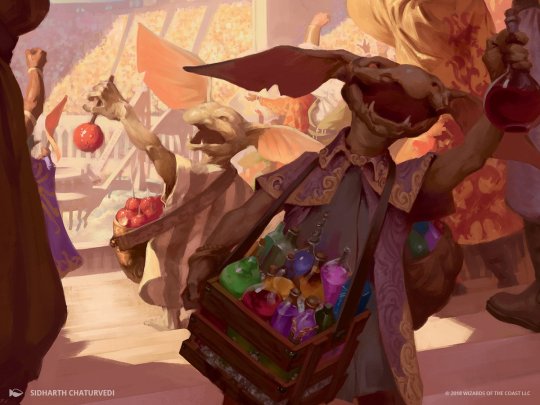
At this point, there's little doubt that Commander is a success as a Magic format. The first officially supported format not to be created in-house at Wizards, Commander is the fastest growing way to play the game and continues to attract players both new and established. As the format continues to grow in popularity and an ever-larger number of players start to try it out, though, there has begun to develop a division in playstyles and deckbuilding choices that has started to cleave the format into smaller subgroups. These subgroups are based on numerous factors -- experience with the format, knowledge of the card pool, a capacity to spend money towards the more expensive cards, and an understanding of how the format differs from traditional sixty-card Magic variants are all a part of it. These types of divisions are present in all aspects of the game but are magnified in Commander by the nature of the format being structurally different, and as a result the community has been informally split into subsections by the players within it. Most notable, and possibly most arbitrary, is the division of "casual" and "competitive" Commander, based primarily on game expectations through player attitude and deckbuilding investment. But this division isn't an ideal split, and the names used to identify the cutoff point are vague and open to sliding interpretation.
Other ways of identifying division points have been suggested by people within the community of various standing; one popular method is the percentage scale of Command Zone fame where a player attributes a number to their deck based on the cards that make up its construction. This can be a helpful addition, but is only partially successful in that it only speaks of the deck itself and doesn't involve the player's own attitudes towards the game as a whole. Now, to be fair, everyone enjoys when they win. It's a good feeling to sit down at a table of four and be the last one standing when the dust clears. But not everyone places the same value on the act of winning as others -- Mark Rosewater's classic player psychographics are still one of the primary identifiers that the player base uses to identify themselves and what they hope to "get out of the game." In addition, easily identifiable characteristics of a deck's construction are part of the game's internal language and are well understood by most established players. Terms such as "aggro," "control" or "combo" are common vernacular at this point. That said, it's a bit of a mouthful to say something like "I'm a Timmy-Spike and my deck is combo at 75 percent" every time you introduce yourself, and a newer player will likely look at you like you just stepped out of a flying saucer. I think that's why the two-pronged division of "casual" and "competitive" still holds ground despite its flaws, one of the largest of which is the negative stigma afforded to the word "casual."
Using the word "casual" in modern gaming terms is most often done as a jab, as a way to negatively identify a player that doesn't understand a game well enough to play at a higher level. It's more popular in video gaming, but just as the border between the electronic and physical is broken down by products like Magic Arena, so too does the popular language trickle through into everyday use. While this is certainly not true of every competitively-minded Magic player, many see "casual" players as inferior by nature and some even seek out games with less established players as a way to enforce their perceived higher standing. Speaking personally, a player like myself is most interested with the act of playing and enjoying the game, but I have the longstanding experience and understanding of the mechanics and card pool to shock less-experienced players simply with the plays I make. Any strongly competitive player would likely see me as "just another casual to dreamcrush," but a newer player who's looking to get into the format would likely call me a competitive player if they were looking solely at the cards in my collection at the way I build my decks. This is the problem with the divide being between casual and competitive, because the word "casual" has additional connotations beyond simply its dictionary definition. A new word needs to replace that term to help it move away from the stigma it carries in modern language.
The word I personally have started using is "social." To call yourself social carries some specific connotations as well, but they're more positive on the whole than those carried by "casual." A social Commander player is one who plays for the enjoyment of the game, who does it as a way to meet and interact with people. A social player is open to discussion about the format, and an experienced social player is willing to share their experience to help newer players in their growth. If someone looks through one of your decks and says something to the effect of "Wow, this looks strong, you must be pretty competitive," answering with "I play socially" lets them know that you're interested in fostering positive interactions with them. Social tables are open to everyone, and when combined with the percentage scale or the archetype names, the term "social" can also help more established players identify both the person and the deck very quickly -- "a social combo deck" or "a social 75 percent deck."
As I've said in previous writings, Commander is stronger as a format because it's interesting to a wide variety of players with different goals and playstyles. The fact that it has the capacity as a format to draw both competitive masters and social players shows that it has potential to be a mainstay in Magic's format lineup for as long as the game's lifespan will be, and the continued support of the format by Wizards through the annual deck series means that newer players will have an easy way to jump on whenever they choose. But as the format grows and players join, having a positive way to identify yourself as a player and clarify what you're looking for in a game will only become more necessary and more valuable. No label system will ever be truly concise but leaving the stigma of the "casual" label behind and offering something that's both more friendly and more descriptive will only benefit players of all styles in the long run. While I can't expect to start an uprising in modern slang within such a niche market, I hope this alternative is useful for those who want to try it, and especially for those it directly applies to.
#wall of text#2019#February 1st 2019#magic: the gathering#mtg#magic#wizards of the coast#wotc#wizards#card games#magic the gathering#article#articles#commander#edh#competitive#casual#social#psychographics#player types#player profiles#language#no man's land#identity#player identity
40 notes
·
View notes
Text
alright alright, my meds have kicked in and im out of the weird muck i was in this morning. let’s talk restoration.
restoration’s a bit of a strange subject in magic, actually! a lot of mages don’t even consider it a “proper” school of magic, and a lot of folks who normally abhor magic will take to it happily. it’s probably the most practical school for the majority of people - everyone gets hurt, gets sick, etc.
now we all know that magic comes from magnus, and the magna-ge. but magic is also what constitutes life itself, and even existence itself. i’ve got a theory about this that i’ll probably talk about later.
so we might could theorize that restoration is the act of using magic to restore the inner life-magic of people. i think that’s not very far off! but first we’ve got to consider a few other things, i think - namely, the influence of the divines on restoration magic, and how interconnected the schools of magic are in and of themselves.
so when we’re talking about magic and the divines, we have to mention julianos, of course. but his name isn’t often invoked by healers. he’s more of the patron of very arcane and esoteric forms of magic. what we usually hear connected to restoration are mara, dibella, and stendarr. why not arkay, you might ask? well, he’s about life and death, sure, but he’s more about dying and rebirth than life itself.
okay, so mara is the goddess of love and life. to mara, they’re one in the same, really. to live is to love, and vice-versa. so we can expect her to have something to do with healing magic, right? something, maybe, but she’s more focused really on the “love” part, marriages and whatnot. dibella has some features of healing in her worship, but really, she’s all about beauty and sex and stuff.
stendarr, though? that’s where it gets interesting. stendarr’s all about mercy, charity, and justice. we see all of this with the vigil of stendarr in skyrim, who, guess what? are all about healing. they also fight the undead, using restoration magic.
BUT.... i’ll be frank. i don’t think any one particular divine is the source of restoration magic. you can be healed, your diseases cured, etc, at any altar of the divines. i think the divines’ connection to restoration is through the faith of their practitioners.
but before i continue that thought, let’s examine where the classification of restoration magic comes from. we’ve seen schools of magic get shuffled around a lot over the course of the past several hundred years. we’ve even lost a couple entirely by the events of skyrim, thaumaturgy and mysticism.
the thing about this concept of schools is.....it’s not really an intrinsic property of its spells. it’s a grouping that’s useful for those who study, practice, and regulate the use of magic. there’s a lot of spells that it’s really hard to say why it shouldn’t be in another school, or at least shared between a couple.
why was telekinesis a mysticism spell? wouldn’t alteration be enough to just....move something? how was sleep, a spell that was originally alteration, become destruction? couldn’t it be illusion, by making the target’s mind fall asleep? how exactly do you tell whether fortify or resist spells should be alteration or restoration? does it matter?
my point is, these classifications are ultimately arbitrary. all these effects are ultimately derived from magic that doesn’t care about what school it’s in. and we know that restoration is a relative newcomer as a form of magic, only appearing sometime in the first era.
i think restoration is a derivative of mysticism, alteration, illusion, and alessian faith. let’s break that down:
mysticism is a rather ... strange school. it’s said to be a way to alter magical forces and reality itself, through meditating on “conundrums and paradoxes.” that’s something that might be fun to a psijic or something, who are credited with inventing the school, but it’s rather tedious to most folks, probably even to most other spellcasters. if only there was another way to channel that sort of power....we’ll get to that momentarily.
alteration, is, rather simply, using magic to change the world around you, but within the confines of normal reality. you can make something heavier or lighter, make something shine with an inner fire, open and lock doors, block attacks, walk on water ... it’s just a way of using magic to manipulate your surroundings. it doesn’t necessarily change how reality works, like mysticism does.
illusion affects the mind, and how it perceives reality. it changes reality on the most local level: within ones own perception of it. it can be used, notably, to calm targets.
finally, alessian faith. remember how i said restoration only really came to be sometimes in the first era? then, you might ask, how could the gods have anything to do with it, if they’ve been around long before the alessian empire?
let’s put it all together. restoration is the art of closing wounds, fixing bones, curing disease (alteration: change the world around you), soothing pain (illusion: change the target’s perception), and actually transferring energy from magic to actual life force (mysticism: alter magical forces themselves) using faith in the divines (as opposed to studying paradoxes in the original psijic way) to channel that power.
okay, so that’s my definition of restoration magic. but uh, it’s actually NOT what i was after when i went about researching it, lol. what i really wanted to think about was what i thought the extent of healing magic was. by that i mean ... does healing leave scars? if so, is it simply a quickening of natural healing? does it literally close wounds and fuse bones as if the injury never happened?
i think it’s honestly both. it’s the difference between regeneration and healing. regeneration is the quickening of natural healing (say, a healing over time spell), whereas healing is direct and instantaneous healing of injuries. regeneration may leave scars, but those scars may fade quicker, as well. healing is much less likely to leave scars.
my reasoning for this is that we know healing magic is rather common in tamriel, and yet we still see a lot of scars, as well. jiub, for instance, but perhaps even more significantly, emperor reman iii, whose eye was injured and permanently blinded by a former lover. and he had the best healers in the empire to attend to him, almost immediately. it seems to depend on the severity of the injury. it also makes me assume that severe injuries such as severed limbs may be beyond the scope of restoration.
but! what do i know. there may be in-canon instances of such healing that i’m simply not aware of or not remembering. let me know if you have an example!
#tes#tesblr#teslore#restoration magic#im sorry mobile users this is just a REALLY long post#jiu icons#reman iii#tamriel#skyrim#oblivion#morrowind#psijic order#mara#dibella#stendarr#arkay#jiub
48 notes
·
View notes
Text
@ 💥 anon: you're the sweetest! thank you so much for your kind response! for context: essentially anon was asking abt the last nesta post i just made, not to give too much away lol but in short: they are vaguely anti nesta and would just like my opinion and they were literally the kindes and i appreciate that!
i definitely can understand where your frustrations lie, and I've always said that if a character reminds u of something unsavory, that is enough to want to do away with the character. its not anyone's place to argue someone's experience and how it informs their reading into a character. so i read that, and i respect your opinion in regard to that.
and my argument - as you can see through my page or if u followed me on m last blog - has always been the problem with abuse. i don't really believe the story commits to what it wants abt nesta: does it thinks she's abusive? broken? how does the book want to contextualize her behaviors? it just doesn't know what it wants. i have several theories for this: (1) tamlin/rhys as an abusive allegory fails. the story shoots itself in the foot with how it wants to root out, punish or categorize abuse. how much does intention and trauma factor into how we respond to abuse? what is the function of trauma in relation to abuse. like for rhys - the story could have easily positioned him as someone who has to learn rather than someone who is already knowledgeable of 'human' ideals of power and control. it also doesn't know how to inform rhysand's actions without justifying them. we know why rhys does things, but that doesn't mean that (1) it's a good enough excuse for characters in world and (2) that it doesn't still say something abt him. (3) that readers will come away with opinions that match what they're told. hence the idea of a grey character. their actions are debatable.
and this just bleeds into all other characters, especially characters positioned as more 'grey'.
in my opinion, the story would have worked better if it honestly and consistently stuck with nesta as a abusive person. the story has nesta go on these 'redemptive' journies and it doesn't even want to commit to a reason as to what she needs to redeem herself for. the story is too moral for its own good. and i think characters like rhys, nesta, and feyre suffer for it. like SF spends so much time running in circles trying to avoid why it even exists. it won't let feyre be part of the process, it won't let the sisters have a conversation, it won't root out the issue at hand, so it gives these placeholders such as the valkyries and the training to avoid having to address the mess of character dynamics.
like intention and goodwill don't negate abuse. objectively these actions are just abusive all the way around, but then the story doesn't commit to a framework so we get these placeholder arguments like : "rhys abused feyre for her personal gain, and tamlin and nesta abused her for their own selfish reasons." that is an arbitrary framework to measure abuse - its subjective. and its easily manipulated in arguments.
and if a character like feyre wants revenge - the story should just have her do that and let the reader come away with what they think that means for her character. objectively - it would be abusive, but if the story isn't operating in a moral sandwich and allows characters to make decisions based on their own personal goals, then it wouldn't really be a problem.
but the story doesn't do that and so it keeps replicating the same environments of abuse, and it doesn't see a problem bc it has established nesta as bad. and bad means she can't be a victim in any capacity,
and then we get arguments like the one i was addressing in my initial post that almost can't acknowledge that cassian is abusive to nesta bc it wants to believe that nesta's power in one dynamic equals to power in another. or -- we've created this conundrum of arguments that can't truly be addressed bc the underlying problem will be much more apparent. if cassian is abusive, then rhys is, and so on.
i think you'll find that we agree on much more than u think anon, i just think people have isolated themselves into corners of the fandom and have created these ideas that acknowledgement of one thing negates another. we can argue that nesta abused feyre, but we can also argue that nesta was a victim of cassian and of rhys.
like cassian's actions towards nesta are just abusive. and the story just passively allows it to happen bc it (1) believes violence and sa are conduits of redemption (e.g. rhys, lucien) and (2) it doesn't know what issues to address so it just has cassian 'punish nesta' without acknowledging why or the sheer disadvantage: nesta has no money, no friends, not home, no close family, no one but him. nothing but the close he has her wear, the food her has her eat. nesta has to make her own friend before she can even begin to heal. there is no power for her there, and there is no such thing as 'mutual abuse' cassian is just often angry at nesta bc the story thinks he should be angry. and it makes his abuse all the more scary. we get these arguments that are like 'cass would never' and then we get the hike scene and i think 'wouldn't he?" he can fly out of there, he can brave the steps, he has a job that pays him more than he will ever need, he can fuck and drink his depression away, he can walk away. nesta cannot. and that's abuse.
to conclude, this doesn't have to be a moral argument, but it so often becomes one bc the story only solves one abusive situation by altering the framework of abuse as it sees fit. i respect your opinion and i really appreciate your message it was genuinely nice and open and i wish there were other people like u who can hate a character but sustain the integrity of your argument. and i am happy u saw that cass was abusive even when u hate nesta. that's really the important part! thank you for your vulnerability❤️
#anti sjm#anti sjm: nesta archeron#wish u guys could see this anon bc THIS is fandom etiquette#anti acosf
22 notes
·
View notes
Text
Relevant excerpt from Jennifer Diane Reitz’s memoir
When I was first facing transition, I had only one book, Jan Morris’s ‘Conundrum’, and a few snatches of televised information as my entire basis for understanding my plight. I just assumed that I would become a heterosexual woman out the other side, a proper Suzy Homemaker with husband and adopted baby. This was certainly what my doctors seemed to desire me to be, and I dearly wanted to please my doctors, because they held my very life in their hands. I was willing to do anything, be anything, to earn my passage to womanhood. I had little concept of even what that meant exactly, only that that was clearly my goal.
Certainly nothing would stop me in my quest. Not even the truth. My first, early, evaluations by a psychologist indicated that I had a "masculine oriented mentation", and would not be a safe candidate for surgery. I was "penile fixated". This was news to me. So I had hit the books at my college library, to find out how on earth such a conclusion could possibly be reached. What learned shocked me. The tests I had been given, the Rorschach Ink Blot Test, as well as other visual tests involving pictures of people and scenes, were not grounded in any rational science. In fact, they are essentially arbitrary, culturally based catalogs of expected interpretations, based on a laughable model of what it means to be female or male of mind.
For instance, if one sees in a random inkblot suitably feminine images, such as flowers and cooking pots, then one is judged female. If one sees cars and planes, then one is judged a boy. It is that silly. In my first evaluations, I saw what was relevant to my life. I played fantasy games, so I saw dragons and griffins. I read science fiction all of my life almost exclusively, so I saw starships and galaxies. I studied science, so I saw cells and DNA. Guess what? According to respectable psychology, none of these things could possibly interest a woman. Only men should care about, and envision such things. Women should only see domestic subjects, or matters relating to child care.
To say this angered me alone would be to ignore the vast disillusionment and disgust I felt. I resolved that no idiotic psudoscience would determine my survival. I studied the same textbooks that my psychologist used.
My next evaluations uniformly portrayed me as the ideal of blessed womanhood. I saw butterflies and daffodils. I saw train tunnels and doughnut holes. I saw diapers and teapots. And the most telling part is that my psychologist ate it up with a spoon. Of course all of that useless, degrading therapy I endured to meet the standards of care must have helped me to grow into a successful female psychology. How wonderful was the science of psychotherapy. Back pats all around, and a hug for our exemplary case study.
There is no shame in lying to tyrannical fools to save your own life.
4 notes
·
View notes
Text
Dear Diary: New Year’s Resolutions
Did you know that “New Year’s” is the way it is because it’s actually a short-form for “New Year’s Eve”? Unless you’re talking about resolutions, which we are, because then the resolution belongs to the year as a whole, and “New Year’s” means belonging to the new year. But why are they both capitalized like proper nouns? It’s rather confusing for those of us who like to be as proper as possible with a language as difficult as English. Only one day is a holiday, and that’s January first, or “New Year’s”, not the whole year, or “new year.” Even for the first couple of weeks you’re supposed to say “Happy New Year,” with titlecase, despite this contradictory conundrum.

That’s what the interwebs say, anyway. And we try not to judge the interwebs — it’s touchy. Especially when it’s being judgy, then it’s touchy about people who aren’t judgy, and it’s even touchy about people who are judgy but in a way that disagrees with the interwebs. Better to stay clear, especially when talking about grammar.
First New Year’s resolution broken: take less rabbit trails. But they do say to stop and smell the rabbit’s foot so it brings you good luck. I don’t know why they freak out so much when I try. It’s more humane than trying to wear one.
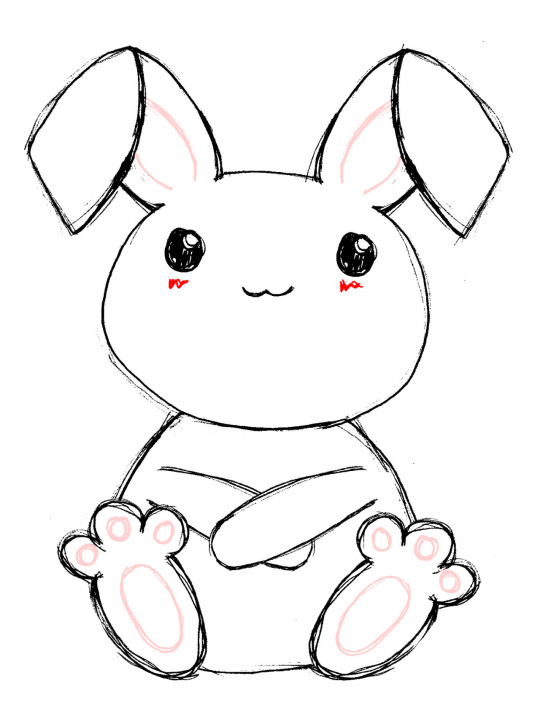
Why do people make New Year’s resolutions, anyway? It’s not like you have to wait until some dead guy named Gregory says the year rolls over. Who does he think he is that he gets to tell the rest of us which arbitrary point around the sun counts as the beginning of the year? The pope or something? Why can’t we all use our personal years and make birthday resolutions?
I don’t think I’ve ever even made a resolution I liked, except maybe my resolution not to make resolutions. But I couldn’t figure out if I’d broken that one before or after I made it, so I counted it as one of last year’s and moved on to this year’s. This year’s aren’t any better, though, because, according to statistics, eighty percent of people fail at their resolutions by the end of January. And who am I to go prove statistics wrong?
Resolutions are so cumbersome.
Unrelated: In older English, “cu” means “cow” (we’re talking really old English here) and “cumber” means “hindrance, obstruction, or burden.” So, a cucumber is a burdensome cow. You can thank me later.
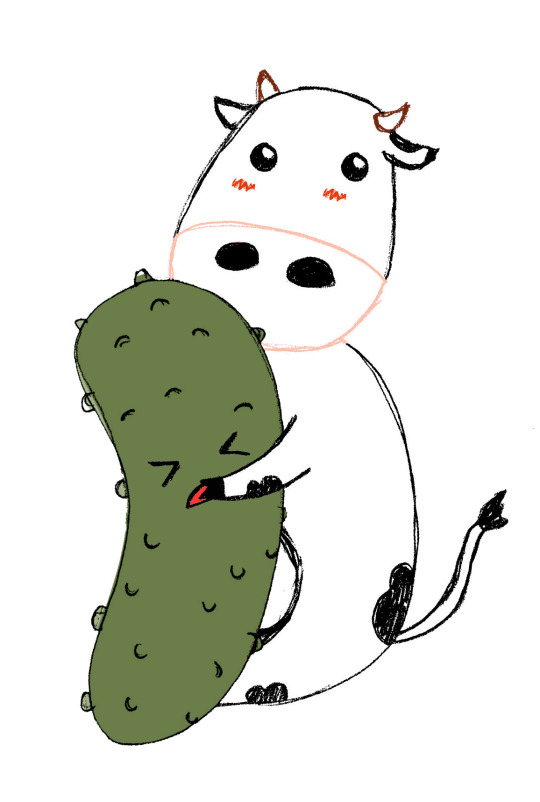
I decided to poll people on campus to see what they thought of New Year’s resolutions and maybe even be brave enough to ask what they resolved to do, but then I found out that there aren’t any classes until the second week of the year. I don’t understand. Where else do people go?
I found the people by going to the supermarket nearby instead, and my field research showed that nine out of ten people aren’t comfortable being asked by stranger in the vegetable aisles about their New Year’s resolutions. Go figure. I would have thought people buying vegetables were on some kind of diet. But I did get a single sample, and the ‘conversation’ went something like this:
“I make resolutions, I’ve got tons of resolutions. The best resolutions. This year I resolved to make more resolutions than ever.”
“How many did you make?”
“This year I made like a hundred. Maybe two hundred. That’s a lot.”
“How do you keep track of so many resolutions?”
“There’s no problem with how many resolutions I make.”
“What do you mean?”
“It just comes naturally, you know? One minute, I’m buying vegetables, and the next, I’m talking. I said to myself, on new year’s, I’m gonna talk more, that’s what I said, and now here I am, talking.”
I cringed at how he said New Year’s. “So you remember them after you do them?”
“If I don’t remember them, I don’t have to feel guilty about the resolutions I don’t do, if there is such a thing.” He paused for a moment as he looked very intently at a radish that he’d been holding for some time. “What about you? Now that I think about it, I might have made a resolution to ask at least one question this year.”
I fidgeted with a turnip. “What about me?”
He looked up absentmindedly. “Excuse me, I didn’t see you there.”
I thanked him for his time and left. When I reached the bus stop I found out that something stank. It was my bag; I’d bought the turnip. I hate turnip. I guess that means ten out of eleven people don’t like talking about their resolutions in the vegetable aisles.

Afterwards, I went home to see my family, since, you know, school was closed and everything. I dumped my bag out on the kitchen counter to air it out and caught the attention of a monster.
“Nice of you to turnip!”
I sighed. “I’m doing research on New Year’s resolutions. Did you make any?” Yes, my own speech has proper capitalization, thank you.
“I resolved to turnip a new leaf.”
“Dad, it’s turn OVER.” One thing I hate more than turnip is jokes about turnip.
“I’ll make turnip pie, then,” he said as I was leaving, “get it? Because a turnover is a type of pie?” Then there was a thud and a yelp. “Anyone who thinks only onions can make you cry has never dropped a turnip on their toe…”
I sat down on the couch to get away from the atrocities. This backfired.
“Watch it! You’re bouncing the couch and making it harder to read. Plus you stink.”
“Couldn’t you resolve to be nicer to me?”
“Resolutions are for people who need excuses to do things, like you. What’s dad making, anyway?”
“Ugh. Cucumber,” I muttered under my breath.
“You can’t ‘make’ cucumber,” my sister said dismissively.
“If I tried, I’d be in quite the pickle!” wafted out of the kitchen.
I went upstairs to my room.

Anyway, Diary, I’ve resolved to write in your pages more often. I hope that’s ok.
Scratch you later, Diary.
-Q.
2 notes
·
View notes
Text
BLOGTOBER 10/11/2018: THE SEVENTH SIGN
Because my childhood viewing habits were dictated by the tyrannical MPAA, I grew up with a pretty sharp awareness of which horror rentals were graced with less than an R rating. Not that a PG or PG-13 guaranteed that I’d be allowed to watch whatever I wanted, but it gave me a little extra leverage to beg and plead my way to seeing the odd POLTERGEIST or THE GATE. Because of this desperation, THE SEVENTH SIGN was definitely on my radar, although I never saw it. Having finally broken the proverbial seal three decades after its release, I can’t imagine what I would have thought of it.

Carl Schultz’s utterly bizarre religious thriller concerns an extremely pregnant Demi Moore, whose lawyer husband Michael Biehn is struggling to appeal the death sentence conviction of one of his clients: the “Word of God Killer”, a young man with Downs Syndrome who murdered his brother-sister parents to punish their incestuous sin. Demi, who is sort of an idiot, blithely puts down a lot of money-they-don’t-have on a creepy elite preschool even though she has a history of losing pregnancies; I guess she was just really compelled by that culty display of children dressed as pilgrims gravely performing The Battle Hymn of the Republic. To compensate for Moore’s constant spending on fancy Italian nursery furniture despite Biehn’s rapidly declining career, Moore and Biehn open their home to a spooky boarder. Prior to installing himself on their property, Jürgen Prochnow--AKA Jesus Christ--has been traipsing about the earth setting off a series of signs of the biblical end times. As per the Jewish mystical concept of there being a Hall of Souls with finite content, all these doomy phenomena are leading up to a seventh sign of the apocalypse, the birth of a baby without a soul. When nosey Demi Moore investigates a collection of serial killer-y news clippings and documents among Prochnow’s belongings, she figures out her boarder’s secret identity and his sinister mission. To seal the deal on the whole end of the world business, *somebody* is going to have to be martyred for God’s Word, and *somebody* is going to have to have a miscarriage. Guess who’s who!
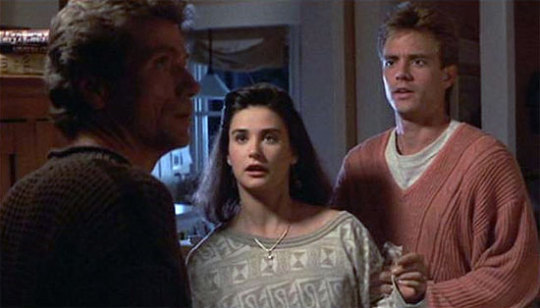
If you followed all that, then you have understood correctly that the bad guy in this movie is God. Jesus is going around busting up all these ancient seals that trigger the end of the world (yeah, I know, but THE SEVENTH SEAL is already a movie), and this whole process is being encouraged and protected by one of Pontius Pilate’s thugs, Cartaphilus--who has been cursed with immortality by the pissed off God, and who can only get out of this Vampire: The Masquerade-esque conundrum by helping the apocalypse along. Even if I were to agree that this all makes perfect sense, I would still have to ask: What is the message of this movie? I mean, I’ll tell you what happens at the end, if it will help you help me figure it out. It turns out that Demi Moore is the reincarnation (yes, I guess there’s reincarnation in this iteration of bible stuff) of Seraphia, who tried to offer Jesus some water before his execution. She fails to prevent the martyrdom of the Word of God Killer, and then apparently miscarries, but she manages to revive her dead baby by like...um, faith? She has these constant past life flashbacks where Cartaphilus asks her if she would die for the ailing Christ, and when she finally says “yes” to this, she passes away as her baby returns to life. Not that her baby is supposed to be Jesus, Jesus is still on the scene here. But this action, we’re told, refills the Hall of Souls, and then everything’s cool again. Jesus and Michael Biehn come talk to Demi Moore’s dead body in the hospital about how rad it is that she had so much hope, like the most hope of anybody ever, so much hope that it stopped the end of the world. Hooray!

Those are the facts. I don’t know what this is supposed to boil down to. The ending makes it feel like it’s the story of how one person’s display of love and kindness saves the world--so like, the message could be that you should nurture your own humanity, because that practice metaphorically contributes to saving the world. But meanwhile, it feels like we have this God who is really caught up in his own bureaucratic nonsense, which places Jesus Christ and an evil Pontius Pilate guy on the same side of the law, and which subjects a suffering humanity to a series of basically arbitrary punishments. That part would be sort of cool, if it didn’t conclude with this sappy thing about how God is placated by Demi Moore’s piety and selflessness, which takes us back to a sense of justice and mercy. In one standout scene, a young Hassid named Avi, who is translating all the shit Demi Moore stole from Jesus’ luggage, goes to a Catholic church to argue with an incredibly smug priest (John Heard). While the latter laughs into his collar at the former’s apocalypse anxiety, Avi ruminates on the idea that though people of different faiths ardently condemn each other, “Maybe none of us are going to be saved--maybe we’re all wrong!” This elevates the perfectly acceptable idea that the word of God is just a collection of unfair punishments for victimless crimes, and/or a way of dealing with logistical problems in Heaven like a soul deficit, so maybe God is not that good of a guy, maybe he’s someone worth resisting. Unfortunately, THE SEVENTH SIGN isn’t willing to be that outright satanic, so instead of an excitingly weird secular thriller, we have this incomprehensible religious horror movie in which I can’t totally figure out how I’m supposed to feel about everything.
One thing is for sure: The movie could only have been made exactly when it was made, when shows like Highway to Heaven entered the mainstream, and rumors of widespread ritual abuse were a normal thing for the general public to entertain. There are two kinds of Satanic Panic movies: Occult fantasies like THE GATE and EVILSPEAK and ROCK’N’ROLL NIGHTMARE, and in a small but fascinating minority, films that seem to be motivated by earnest spiritual paranoia, like THE RAPTURE and THE SEVENTH SIGN. I haven’t been able to prove anything about what Carl Schultz was thinking when he made the latter film, although I’d be interested to find out. For now, I’m only left to wonder...and wonder whether a 1974 made for TV movie he directed called A HARD GOD, which is honestly a pretty fabulous thing to call something, bears any clues. I’ll probably never know.
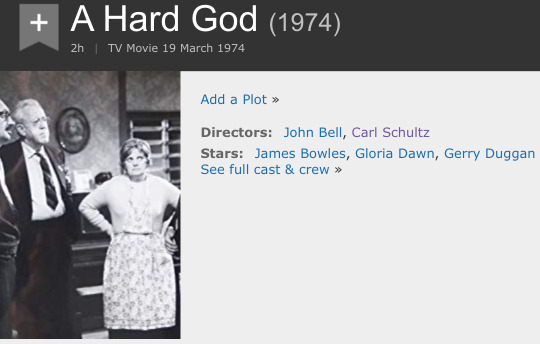
#the seventh sign#carl schultz#Clifford Green#Ellen Green#Demi Moore#michael biehn#jurgen prochnow#religious horror#horror#fantasy#supernatural#blogtober#apoclypse
7 notes
·
View notes
Text
Fallacies That Have Made Me Mad Lately
Note: These are the fallacies that I hear the most in my daily life as a Vegan. I generally hear these fallacies made in arguments against Veganism. I will avoid using Vegan analogies in my discussion of these fallacies, because these points are important to make regardless of opinions on the Vegan lifestyle. I will allow you, the reader, to make these connections if you choose to do so. Another important thing to note is that I am in no way claiming to be immune to committing these very fallacies I discuss. I, like you, am human and because of this I am incredibly fallible. If you see me committing a logical fallacy I sincerely request that you attempt to explain what I did wrong (in a polite manner), and I will do my best to hear out your explanation. I will grant the same respect to all of you as well :).
Appeal To Futility: This fallacy is based on the false idea that if something can’t be entirely changed or altered by an individual, there is no purpose in attempting to do one’s part in reducing bad outcomes. This fallacy is often spoken by an individual who does not want to change their behavior despite understanding the ethically questionable nature of their actions. An example of this fallacy in action would be a litterer refusing to throw refuse in the garbage can, based purely on the assumption that there will always be litterers, so there is no point in attempting to reduce environmentally unfriendly behaviors. A good way to detect if this fallacy is being enacted is to ask the question “If everyone conducted themselves this way, would the world be better, or worse?”. If the answer is worse, there is a very good chance that an Appeal to Futility is being made. We live in an imperfect world, and it will always be an imperfect world. This does not mean that we do not have a moral obligation to make the world better.
Appeal To Nature: This fallacy is based on one party assuming that because something is present within the natural world, it must be good, or conversely, because something is absent from the natural world, it must be bad. This fallacy is using entirely arbitrary means to decipher somethings moral value. I would argue from a practical standpoint that the boundary between the natural world and the synthetic world is often difficult to tease apart in the first place. There does not seem to be any question that plants such as trees and flowers are natural, but when extended to the animal world things get a bit more confusing. Beavers and bees are likely natural, but what about their homes? Are dams and beehives natural because they are made of materials harvested from the environment, or are they synthetic because they required intelligent life to be created. What about human homes? Is a log cabin natural? I don’t know the answers to these questions, and that is precisely my point. But, ignoring the difficulty in teasing apart the natural vs. synthetic world, I don’t think the argument of something being present in the natural world is a very strong argument towards it’s ethical nature. For example, my biological drive to procreate with those I deem attractive is entirely natural, a result of evolution and instinct. However, we can understand that it may not be the most ethical action to cheat on my significant other because of this natural drive. Take another example. Infanticide, the murdering of infants, is something that occurs within nature. No synthetic materials are involved in the decision of an animal (human or otherwise) to murder their own infant. We can intuit that the murder of a baby for pleasure is a decidedly immoral act, despite it’s presence in the natural world. Coming from the other side of the spectrum not all things that are synthetic are unethical either. For example, the harvesting and manipulation of energy needed to power the lights in your home, or the device you are using to read this blog on is synthetically, or unnaturally, made. Harvested electricity is an unnatural phenomenon, but we do not reasonably state it is unethical or wrong for it to exist. It is important to note that this electricity can absolutely be unethical (the potential for pollution, etc.), but the ethical conundrum present is not based on controlled electricity's status as an unnatural or synthetic product.
Moral Subjectivity: This is the type of faulty logic I hear the most, and I find it to be the most dangerous to the pursuit of a just society. While it is true that there is no physical manifestation of good morality that can be weighed or measured, this does not mean that the symbolic value of ethics does not hold meaning. Words and ideas that we have created do indeed hold important meanings and values. Take Justice for example. While there is no physical manifestation of Justice, this does not mean that we can apply the values associated with this concept to any given scenario. While we can (on a syntactical level) say that the murder of an innocent person is just, on a semantic level we understand this to be false. We can not pervert the meaning of Justice to fit any scenario we wish. Most of us understand that this is not an acceptable excuse for intentionally committing immoral actions. We do not accept the ethereal nature of morality as a valid excuse to commit heinous acts of murder, or great bodily harm. Every time I hear this excuse, the angry ethicist inside me has a massive desire to mug the fallacious thinker and burn their home down, but I understand that would be a breach of proper morality, and I abstain from doing so. But if morality isn’t some entirely futile concept to be morphed into fitting our world views, how can we really access it? Great question, hypothetical question asker! I think the best way to reach our ethical/moral apex is through genuine philosophical and logical debate. The ability to and desire to learn and grow is the mark of an incredibly strong person. I think that the best way to construct our ethical framework is to build from the bottom and work our way up, rather than start from the top and work our way down. What I mean by this is that we should let the strength of opposing arguments decide our world view, rather than having a set world view and constructing arguments to lead us towards that destination.
Thank you all so much for listening to my ramblings, and I hope you’ve had a fun time reading along. May we all grow today to be better tomorrow,
perpetuallyangryethicist
1 note
·
View note
Text
My Pet Peeve Diary: the Flashback Conundrum
I don't want to complain, but... okay, that's a lie. I want to complain. I live for complaining about the things writers do as much as I enjoy simply analyzing and praising the writing. This is probably why I'm not a good candidate for paid reviews and social media hustling, haha. Anyway, pet peeve time: why oh why does anyone think it's a good idea to have flashbacks as super fake 'dream memories'?
This is not merely an irritant found in newbie writing, the way repetitive phrasing or even typos can be, or referring to characters by their eye color or as the 'dark-haired man', 'the middle-aged man', etc. Although God knows that is mighty annoying and I boggle to understand why any person above the age of 18 thinks that's a good idea, let alone a published author. No, this is more than an annoyance, although it too is stupid and unnecessary and breaks the flow. But more than that, you can at least make an allowance for the rest because at least some people are tall, middle aged or have gray eyes. Likewise, even if description repetition in a series drives me nuts personally, you can argue this sustains style and makes sure new readers are always caught up. Okay, good enough. But dream memories... it jolts me out of the narrative every time, because the fact is there is no such thing as a 'dream memory', as far as I can tell. More importantly, they certainly don't happen every time you dream and/or lose consciousness, let alone the exact memory most relevant to the current situation, unaltered and full of lifelike detail.
This is the question that suddenly comes to mind when I see such flashbacks: do you, the author, think the reader is an idiot? I feel like I'd have to be to buy into this. Apparently the reader (in this case, me) is such a simpleton that I need flashback info dumps conveniently "disguised" as a dream because otherwise I might not be able to follow. Also, I had thought the extra step of making the dream flashback italicized was a fanfic thing, but no. Published authors like Jennifer Estep also apparently think italicizing dream flashbacks will help those all the way over in the back of the class follow along. And yeah, I realize this is the sort of thing people excuse by saying 'it's just fiction'. Ergo, it doesn't matter that in reality, no one dreams in correctly recalled memories, let alone experiencing them while they've been knocked unconscious. In genre fiction discussions online, this is a cue for the defense to mention the fact that magic also isn't real (an argument people continue to love, seemingly clueless as to its utter irrelevance and triteness). Anyway, that's what poetic license is for, isn't it? And besides, you have to include the flashback somehow.
Flashbacks are difficult things to integrate. Most ways you can include them in the text aside from a prologue will inevitably break the narrative flow. Especially if you have a first-person narrative, such as the Elemental Assassin series. This a conundrum. Fair enough. But the fact is, anything is better than treating one's readers like they're idiots, up to and including interspersed chapters in the third person or chapters set in the past. In fact, this is what chapters are for: that exact kind of sometimes arbitrary separation in time or perspective. Almost all professional writers I've enjoyed have indeed placed flashbacks into their own separate chapters, only differing in whether or not they label the time or leave the context to make itself clear. There's a reason for that: that's a best practice in writing. Alternatives are pretty thin, and most of them are painfully, cringe-worthy awkward. Not a good look.
Okay, glad I've got that off my chest. No big point to this overall, but now I'm slightly appeased. Carry on, hehe.
3 notes
·
View notes